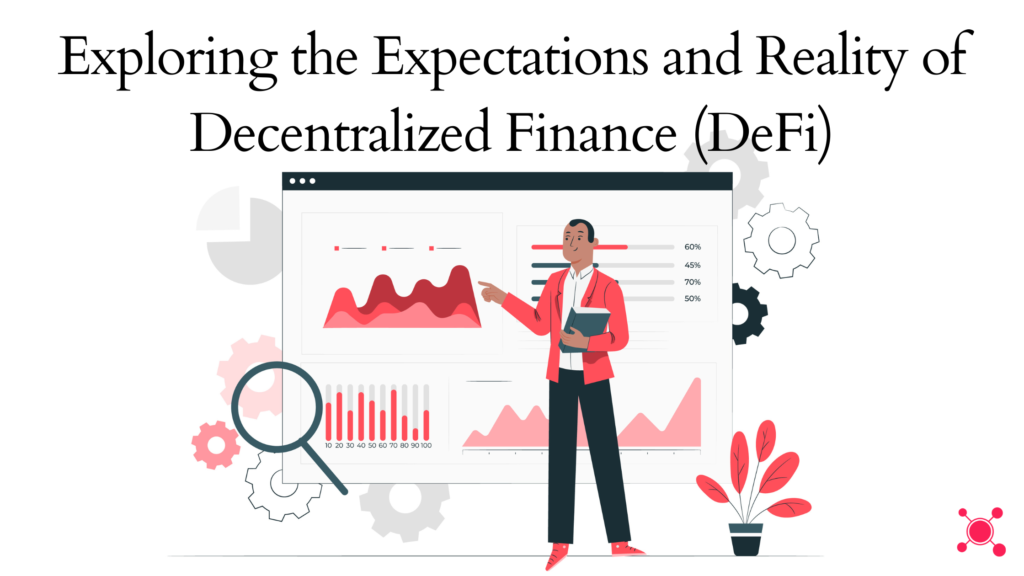In recent years, decentralized finance, or DeFi, has emerged as a groundbreaking concept that has the potential to revolutionize the financial industry. It promises to democratize financial services, eliminate intermediaries, and provide greater financial inclusivity for individuals across the globe. With such lofty expectations, it is important to examine the core principles of DeFi and understand how blockchain technology plays a pivotal role in enabling this decentralized ecosystem.

Decentralized Finance (DeFi) has emerged as a revolutionary concept in the world of finance. It refers to a system where financial services are built on blockchain networks, utilizing smart contracts to automate and streamline transactions. Unlike traditional finance, which relies on intermediaries such as banks, DeFi operates autonomously with the help of decentralized applications (DApps). These DApps are powered by smart contracts, which execute pre-programmed rules without the need for human intervention.
DeFi has gained significant attention and popularity due to its potential to revolutionize the financial industry. By leveraging blockchain technology, DeFi aims to create a more inclusive, transparent, and efficient financial ecosystem.
The Core Principles of DeFi

At its core, DeFi is built upon three fundamental principles: transparency, accessibility, and security. These principles are the driving force behind the development and adoption of decentralized financial systems.
Transparency is achieved through the use of open-source protocols, allowing anyone to verify and audit the code powering the decentralized applications. This transparency ensures that the financial system is accountable and free from hidden agendas or manipulation. It also promotes trust among participants, as they can independently verify the integrity of the system.
Accessibility is another key principle of DeFi. Unlike traditional financial systems that often exclude individuals due to various barriers, DeFi is designed to be permissionless. This means that anyone with an internet connection can participate in financial activities, regardless of their geographical location, socioeconomic status, or identity. DeFi aims to provide equal opportunities for individuals to access financial services and participate in economic activities.
Security is a critical aspect of DeFi. The use of cryptographic techniques and the elimination of centralized points of failure ensure that financial transactions and assets are protected from unauthorized access or manipulation. By leveraging the immutability and decentralized nature of blockchain, DeFi applications provide trustless and tamper-proof financial services.
The Role of Blockchain in DeFi

Blockchain technology plays a crucial role in the functioning of DeFi. It serves as the underlying infrastructure that enables the decentralized and transparent nature of the financial system.
One of the key advantages of blockchain technology is its immutability. Once a transaction is recorded on the blockchain, it cannot be altered or tampered with. This feature ensures the integrity of financial transactions and eliminates the risk of fraud or manipulation. In the context of DeFi, this immutability provides a high level of trust and security to participants.
Decentralization is another important characteristic of blockchain technology. In a decentralized network, there is no single point of control or failure. This means that no single entity has the power to manipulate or control the financial system. Instead, the decision-making power is distributed among the network participants, ensuring a more democratic and inclusive financial ecosystem.
The use of smart contracts is a key feature of DeFi applications. Smart contracts are self-executing contracts with the terms of the agreement directly written into code. They automatically execute transactions and enforce the agreed-upon rules without the need for intermediaries. This eliminates the need for trust in third parties and reduces transaction costs. Smart contracts ensure that transactions are executed as programmed, providing participants with a high level of certainty and efficiency.
Furthermore, blockchain enables interoperability between different DeFi protocols. This means that users can seamlessly transfer assets and interact with various decentralized applications within the DeFi ecosystem. Interoperability enhances the overall user experience and fosters innovation by allowing different protocols to work together and leverage each other’s strengths.
In conclusion, DeFi represents a paradigm shift in the financial industry. By leveraging blockchain technology and smart contracts, DeFi aims to create a more transparent, accessible, and secure financial system. With its core principles of transparency, accessibility, and security, DeFi has the potential to revolutionize traditional finance and empower individuals worldwide.
The Expectations of Decentralized Finance

The expectations surrounding DeFi are immense. Advocates believe that it has the potential to address the limitations of traditional finance and provide numerous benefits for individuals and businesses alike. Let’s explore some of the potential benefits of DeFi.
Potential Benefits of DeFi

- Financial Inclusion: DeFi has the potential to provide financial services to the unbanked and underbanked population, who currently lack access to traditional banking facilities.
Financial inclusion is a critical aspect of DeFi that aims to bridge the gap between the privileged and the underserved. By leveraging blockchain technology, DeFi platforms can offer financial services to individuals who have been excluded from the traditional banking system. This includes people in developing countries with limited access to banking infrastructure, as well as those who have been marginalized due to socioeconomic factors. Through DeFi, individuals can have access to savings accounts, loans, and other financial tools that can empower them to improve their economic well-being. - Global Accessibility: With DeFi, individuals can access financial services from anywhere in the world, without being restricted by geographical boundaries or local regulations.
One of the most significant advantages of DeFi is its ability to transcend borders. Traditional finance often faces challenges when it comes to cross-border transactions, with high fees and lengthy processing times. DeFi, on the other hand, enables individuals to access financial services seamlessly, regardless of their location. Whether you’re in a remote village in Africa or a bustling city in Europe, as long as you have an internet connection, you can participate in the DeFi ecosystem. This global accessibility opens up a world of opportunities for individuals and businesses to engage in international trade, investment, and collaboration. - Reduced Intermediaries: By eliminating intermediaries, DeFi can streamline financial transactions and lower costs, benefiting both consumers and businesses.
In traditional finance, intermediaries such as banks, payment processors, and clearinghouses play a crucial role in facilitating transactions. However, these intermediaries often come with fees, delays, and potential points of failure. DeFi aims to remove these intermediaries by leveraging blockchain technology and smart contracts. By doing so, DeFi platforms can automate and streamline financial transactions, reducing costs and increasing efficiency. This not only benefits consumers by providing faster and cheaper services but also empowers businesses by enabling them to operate in a more cost-effective manner. - Permissionless Innovation: DeFi encourages innovation by allowing developers to build new financial products and services on existing protocols without seeking permission from centralized entities.
One of the most exciting aspects of DeFi is its permissionless nature. Unlike traditional finance, where innovation is often limited by regulatory requirements and the need for approval from centralized entities, DeFi allows developers to experiment and build new financial products and services without seeking permission. This fosters a culture of innovation and entrepreneurship, where anyone with the necessary skills and ideas can contribute to the evolution of the financial ecosystem. As a result, we are witnessing a rapid expansion of DeFi applications, ranging from decentralized exchanges and lending platforms to prediction markets and insurance protocols. - Greater Security: The use of smart contracts and cryptography ensures that transactions are secure and resistant to fraud or tampering.
Security is a paramount concern in the financial industry, and DeFi addresses this through the use of smart contracts and cryptography. Smart contracts are self-executing agreements that are coded on the blockchain, ensuring that transactions occur only when predefined conditions are met. This eliminates the need for trust in intermediaries and reduces the risk of fraud or manipulation. Additionally, cryptography is used to secure user identities, protect sensitive information, and ensure the integrity of transactions. By leveraging these technologies, DeFi provides a high level of security, giving users peace of mind when engaging in financial activities.
Predicted Challenges and Risks
While the potential benefits of DeFi are promising, it is essential to acknowledge the challenges and risks that come with its adoption.
The Reality of Decentralized Finance

As DeFi continues to gain traction, it is crucial to assess its current state and understand its real-world impact.
Current State of DeFi Market
The DeFi market has experienced significant growth, with a surge in the number of projects and investments pouring into this space. As of now, the total value locked in DeFi protocols exceeds billions of dollars, reflecting the increasing confidence in this emerging industry.
Real-world Impact of DeFi
DeFi has the potential to disrupt traditional financial systems by offering a wide range of decentralized financial services. It enables individuals to access loans, earn interest, trade assets, and participate in various other financial activities without the need for intermediaries.
The Gap Between Expectations and Reality

While the expectations surrounding DeFi are high, there are still significant hurdles to overcome in order to bridge the gap between expectations and reality.
Overcoming the Hurdles in DeFi Adoption

To achieve mainstream adoption, DeFi must address scalability issues, interoperability challenges, and regulatory concerns. Efforts are underway to tackle these obstacles through technological advancements and collaborations with regulatory bodies.
Future Prospects of DeFi
The future prospects of DeFi are promising. As the industry matures and overcomes its challenges, we can expect to see increased adoption and the emergence of innovative solutions that transform the financial landscape.
Conclusion: The Future of Decentralized Finance

To achieve mainstream adoption, DeFi must address scalability issues, interoperability challenges, and regulatory concerns. Efforts are underway to tackle these obstacles through technological advancements and collaborations with regulatory bodies.
Balancing Expectations and Reality in DeFi

While the potential of DeFi is vast, it is important to approach it with caution and strive for a practical understanding of its strengths and limitations. By maintaining a critical mindset and promoting responsible innovation, we can unlock the true potential of decentralized finance.
The Road Ahead for DeFi

While the potential of DeFi is vast, it is important to approach it with caution and strive for a practical understanding of its strengths and limitations. By maintaining a critical mindset and promoting responsible innovation, we can unlock the true potential of decentralized finance.
The Road Ahead for DeFi

The road ahead for DeFi is filled with opportunities and challenges. As the industry continues to evolve, collaboration between stakeholders, including developers, regulators, and users, will be crucial in shaping a sustainable and inclusive financial future.



Pingback: Top 5 Development Challenge that will hugely impact Smart Contracts in Financial Apps in 2024 - dappjunction